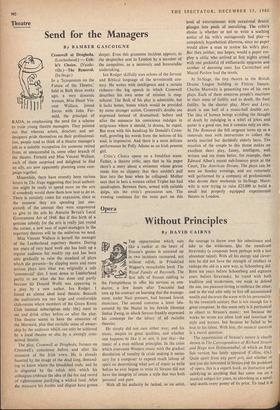heatre
1
Send for the Managers
By BAMBER GASCOIGNE
Cromwell at Drogheda. (Leatherhead.) — Crit- ic's Choice. (Vaude- ville.)—The Removal. (In-Stage.) IN a 'Symposium on the Future of the Theatre,' held in Bath three weeks ago, a very dynamic woman, Miss Hazel Vin- cent Wallace, joined forces with John Fer- nald, the principal of RADA, in emphasising the need for a scheme to train young theatre managers. They pointed out that whereas actors, directors and set- designers pride themselves on their professional- ism, people tend to think of a theatre manager's job as a suitable occupation for someone retired from, or unsuccessful in, some other branch of the theatre. Fernald and Miss Vincent Wallace, each of them surprised and delighted to find an ally, are now apparently planning some cam- paign together.
Meanwhile, there have recently been various letters in The Stage suggesting that local authori- ties might be ready to spend more on the arts if somebody would show them how best to do so. there is certainly room for expansion, since at the moment they are spending just one- sixtieth of the amount they were empowered to give to the arts by Aneurin Bevan's Local Government Act of 1948. But if this birth of a genuine subsidy for the arts is really just round the corner, a new race of super-managers in the repertory theatres will be the midwives we need.
Miss Vincent Wallace is herself the manager of the Leatherhead repertory theatre. During ten years of very hard work she has built up a regular audience for weekly rep and has been able gradually to raise the standard of plays which she presents—by slipping more and more serious plays into what was originally a safe "commercial' diet. I went down to Leatherhead partly to see what she has done and partly because Sir Donald Wolin was appearing in a play by a new author, Ian Rodger. I found an almost ideal local theatre. Beneath the auditorium are two large and comfortable club-rooms where members of the Green Room Club (annual subscription only 10s.) meet to eat and drink either before -or after the play. This theatre seems to have the amenities of the Mermaid, plus that enviable sense of owner- ship by the audience which can only be achieved by a local theatre or else by a strongly com- mitted theatre.
The play, Cromwell at Drogheda, focuses'on Cromwell's conscience before and after his massacre of the Irish town. He is already haunted by the image of the dead king, demand- ing to know where the bloodshed ends; and he is disgusted by the relish with which his colleagues embrace the idea of the fire and sword of righteousness purifying a wicked land. After the massacre his doubts and disgust have grown deeper. Even this gruesome incident appears, in the despatches sent to London by a member of the committee, as a necessary and honourable undertaking.
Ian Rodger skilfully uses echoes of the fervent and Biblical language of the seventeenth cen- tury. He writes with intelligence and a certain richness—the big speech in which Cromwell describes his own sense of mission is mag- nificent. The flesh of his play is admirable, but it lacks bones, bones which would be provided by some stronger action. Cromwell's doubts are expressed instead of dramatised; before and after the massacre his conscience indulges in strip-tease where it should, in drama, be raped. But even with this handicap Sir Donald's Crom- well, growling his words from the bottom of his soul, is impressive. And there is a most delicate performance by Polly Adams as an Irish peasant girl.
Critic's Choice opens on a breakfast scene. Father, a theatre critic, says that in his paper there's a story about a swimmer whose grease made him so slippery that they couldn't pull him into the boat when he collapsed. Mother says that in hers a woman called Triplet has had quadruplets. Between them, armed with suitable quips, sits the critic's precocious son. The evening continues for the most part on this level of entertainment with occasional drastic plunges into pools of moralising. The critic's choice is whether or not to write a scathing notice of his wife's outrageously bad play—a completely hypothetical dilemma, since no paper would allow a man to review his wife's play. But then neither, one'hopes, would a paper em- ploy a critic who arrived at first nights armed with one pocketful of enthusiastic epigrams and another of damning ones. Ian Carmichael and Muriel Pavlow lead the revels.
At In-Stage, the tiny theatre in the British Drama League building in Fitzroy Square, Charles Marowitz is presenting two of his own plays. Each of them concerns people's reactions to their sense of futility and to death, the final futility. In the shorter play, Mort and Levy, death is one half of a music-hall double act. The idea of human beings avoiding the thought of death by indulging in a whirl of jokes and patter is a good one, but it remains only an idea. In The Removal the fell sergeant turns up as a removals man with instructions to collect the newly married but decidedly elderly hero. The reaction of the couple to this threat makes an excellent short play, funny, intelligent, well written and ten times better, for example, than Edward Albee's recent sub-lonesco piece at the Court, The American Dream. The plays can be seen on Sunday evenings, and are extremely well performed by a company of professionals who devote their weekends to In-Stage. Maro- witz is now trying to raise £25,000 to build a small but properly equipped experimental theatre in London.


































 Previous page
Previous page